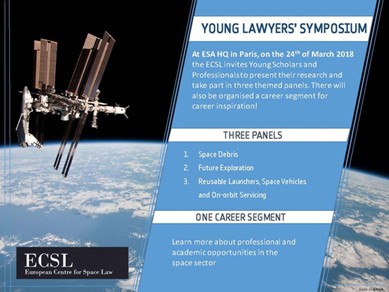Irina Chernykh, PhD student of the International Law Department (RUDN University) became a participant of Young Lawyers' Symposium (YLS)

On the
On the 23 of March, European Center for Space Law held the Scientific and Practical Forum on Topical Issues of Space Law and Policy. Theorists and practitioners working in all fields of the space sector took part in it. Theme of the Forum in 2018: “Questions of cyber attacks in space: legal solutions”, within the framework of which two sections were held: “Cyber-attacks and international law” and “A look into the future: how to identify the threats of cyber attacks in the field of space activities?”.
The European Centre for Space Law (ECSL) brought together young scholars and professionals to take part in the third edition of the Young Lawyers’ Symposium (YLS), which had been organised on the 24 of March 2018 at ESA Head Quarter in Paris.The aim of the Young Lawyers’ Symposium was to allow for early career scholars and professionals to present on a space law related topic in an international forum, exchange ideas and network amongst themselves.The Young Lawyers’ Symposium 2018 centred around three themed sections, considered legal aspect relating to: Space debris“, “Reusable launchers, spacecraft and maintenance in orbit”, “Future use of outer space”.
Such well-known scientists of international space law as S. Markisio, Professor Frans von der Dunk (Director Public Relations of the International Institute of Space Law (IISL), Member of the Board of the European Centre for Space Law (ECSL), and Member for the Netherlands in the International Law Association’s (ILA) Committee on Space Law; M. Rossini, S. Moise, Christian Brünner (since 1980 is Full Professor at the Department for Austrian, European and Comparative Public Law, Political Sciences and Public Administration, University of Graz. He founded in 2001 the National Point of Contact (NPOC) in Austria of the European Center for Space Law (ECSL) and many others took part in the work of the Forum and the Symposium. Besides, representatives NATO, ESA and other enterprises in the field of security.
RUDN scientist named neural networks that will help doctors interpret the results of an electroencephalogram (EEG) and other test of brain activity. The best of them works with almost 100% accuracy, while not only giving the result, but explaining why it turned out the way it did.
To obtain information about objects on the earth's surface and in near-Earth space, it is advisable to use not one, but several satellites. Such satellites move in different orbits, but operate as a whole. This allows us to increase the efficiency and accuracy of the obtained data but requires additional efforts to control the relative motion of satellites. RUDN engineers together with colleagues from Malaysia found a way to effectively control such formations of several satellites.
Ice rock, overnight in the mountains and 6100 meters above sea level... A scientist from the Agricultural Technological Institute went on an expedition to the Tien Shan.
RUDN scientist named neural networks that will help doctors interpret the results of an electroencephalogram (EEG) and other test of brain activity. The best of them works with almost 100% accuracy, while not only giving the result, but explaining why it turned out the way it did.
To obtain information about objects on the earth's surface and in near-Earth space, it is advisable to use not one, but several satellites. Such satellites move in different orbits, but operate as a whole. This allows us to increase the efficiency and accuracy of the obtained data but requires additional efforts to control the relative motion of satellites. RUDN engineers together with colleagues from Malaysia found a way to effectively control such formations of several satellites.